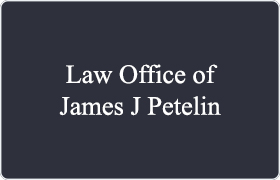Roseville RICO Act Lawyer, California
Sponsored Law Firm
-
 x
x

Click For More Info:
-
Law Office of James J Petelin
1550 Humboldt Road, Suite 4 Chico, CA 95928» view mapDivorce & Family Law Effective, Client-Focused Representation
James Petelin is a practicing attorney in the state of California who focuses on Family Law.
800-943-9701
Not enough matches for Roseville RICO Act lawyer.
Below are all Roseville Criminal lawyers.
Douglas Randall Ensminger
✓ VERIFIED *Status is reviewed annually. For latest information visit hereD. Randall Ensminger been practicing civil and criminal law for over 35 years and found that our clients truly appreciate the time and effort we put i... (more)
Allan Robert Frumkin
✓ VERIFIED *Status is reviewed annually. For latest information visit hereLawyer.com Member Questionnaire Please describe a case(s) in the last year or two where you made a big difference. 1. Last Friday---family law ... (more)
Jelena Tiemann
✓ VERIFIED *Status is reviewed annually. For latest information visit hereJelena Tiemann prides herself on being warm and easy to talk to. She strongly believes in getting to know her clients and all the issues they may be f... (more)
Matthew Nicholas Becker
✓ VERIFIED *Status is reviewed annually. For latest information visit hereSome legal matters deserve to be looked at from the professional perspective of a lawyer. The Becker Law Practice is familiar with laws that impact th... (more)
Richard Thomas Dudek
✓ VERIFIED *Status is reviewed annually. For latest information visit hereRichard Dudek knows the Sacramento courts, procedures and prosecutors. Our highly skilled defense team includes licensed private investigators who use... (more)
Ashley Monique Deguzman
✓ VERIFIED *Status is reviewed annually. For latest information visit hereA graduate from McGeorge School of Law, with a Bachelors Degree in Biomedical Engineering, and extensive Real Estate experience, she is our resident e... (more)
 James Petelin Chico, CA
James Petelin Chico, CA AboutLaw Office of James J Petelin
AboutLaw Office of James J Petelin Practice AreasExpertise
Practice AreasExpertise





